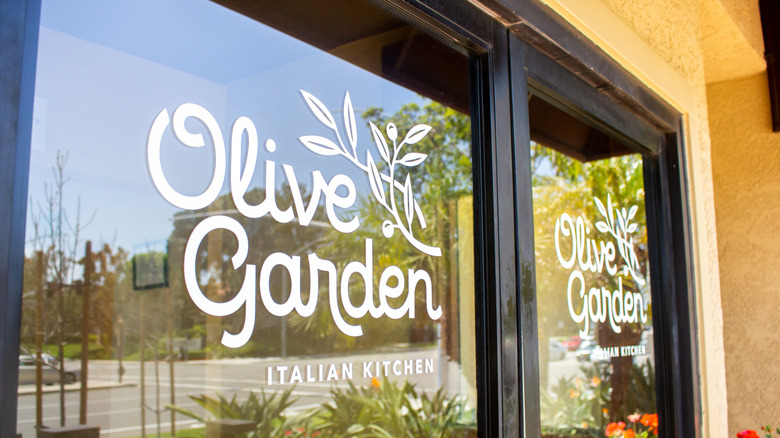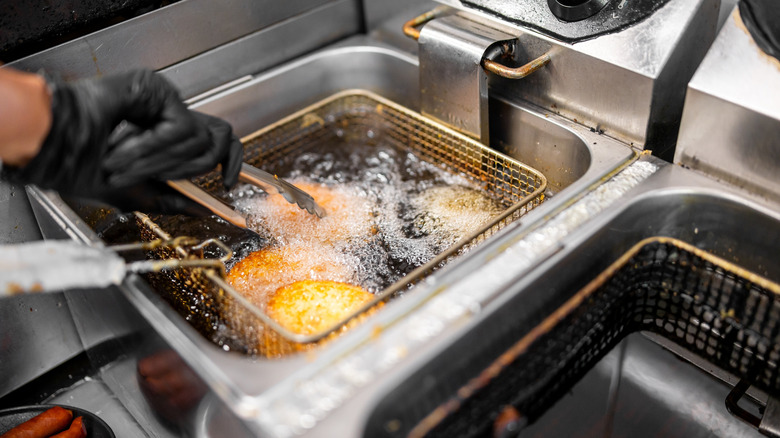The Strict Rules Olive Garden Follows When Handling Food Allergies
33 million Americans – one in ten adults and one in thirteen kids – have a food allergy. So what happens when that one person dines at Olive Garden — where almost all of the "Big 9" (milk, eggs, peanuts, tree nuts, fish, shellfish, soy, wheat, and sesame) food allergens can be found under one roof? It's actually a more thorough process than just skipping the croutons on the house salad or holding the cheese on the spaghetti and meat sauce. The moment the kitchen learns a guest has a food allergy, the entire back of house shifts gears.
Once a server is notified by the guest that they have an allergy, the server not only adds this information to the order, but also notifies a manager and the manager further alerts the kitchen of the allergy. Before cooking even begins, the chef's station is sanitized, their hands are washed, a fresh pair of gloves is put on, and clean cooking utensils are used to ensure a the dish is prepared in a contamination-free zone. Once the dish is prepared, a manager will carry the dish by itself to the guest with the allergy, ensuring that no other meals with allergens come into close contact with it.
Prior to kitchen staff even stepping on the line, they have to be trained about food allergies and how important it is to take proper precautions when preparing a meal for a guest dining with food allergies. Each manager also has completed a food safety course, which includes information about food allergies and safe food handling practices.
Not everything is unlimited: namely, the fryer and gluten
It may be a good idea for guests with allergies to steer clear of anything that goes in the fryer. Olive Garden uses highly refined canola and soybean oil — types that allergy experts generally consider safe for most people with soy allergies, since the refining process removes nearly all the soy protein (the component that triggers allergic reaction to soy). However, Olive Garden does not have a separate fryer to avoid cross-contact with allergens, nor do they change the oil for a guests with allergies who order fried food. As a result, the oil contain particles from previously fried items such as its appetizers like calamari or fried mozzarella, which contain several allergens and contaminate otherwise allergen-free foods.
And then there's gluten – a big concern for many diners. Gluten is a protein found in wheat, barley, and rye. While wheat is one of the top allergens, gluten itself is not. The inability to process gluten stems from celiac disease, an autoimmune disorder that can cause serious health complications or become life-threatening even with trace exposure. Others may be gluten-intolerant or gluten-sensitive, known as non-celiac gluten sensitivity.
Olive Garden guests will notice menu items labeled as "gluten-sensitive" rather than the common "gluten-free" term. The dishes are made without gluten-containing ingredients, like the brown rice rotini pasta, but have not been tested by the FDA to confirm they contain less than 20 parts per million of gluten — the federal standard for "gluten-free." Olive Garden's kitchen staff still prepares these meals with the same process and procedures taken with food allergy orders, including keeping gluten-containing items strictly separate from gluten-sensitive items at all times.
Olive Garden is a chain true to its slogan
Olive Garden's "nutritional & allergens" information page includes a detailed PDF chart that lists each menu item and identifies which of the "Big 9" allergens it may contain, as well as if gluten and/or sulfites are present. The chart also lists if the menu item is grilled or fried. Olive Garden recognizes that dietary restrictions expand beyond common food allergens, so it also provides separate information and menus for vegan and vegetarian options, and a chart listing what items contain pork or alcohol.
While Olive Garden should be locked up for this culinary crime, the chain definitely lives up to it's slogan: "When you're here, you're family." Olive Garden's commitment and policies are set in place to make every guest, regardless of dietary restriction, feel taken care of.
Guests with questions about nutritional or allergen information are encouraged to reach out to the Guest Relations Department online or by calling 800-331-2729. Servers and managers are also trained to assist guests in person, helping them navigate menu options safely. For added peace of mind, Olive Garden's website regularly updates its allergen and nutrition charts, allowing diners to plan ahead before they even sit down to order — just make sure to inform your server if you're dining with allergy.


